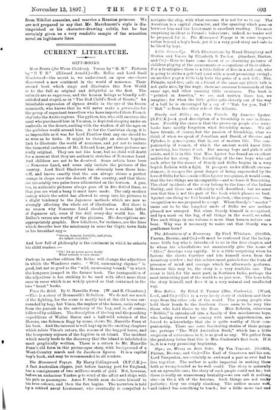Sturdy and Stilts ; or, Firm Friends. By Annette Lyster.
(S.P.C.K.)—A good description of a friendship is rare in litera- ture. Possibly the cause is that the grown-up people who write books have mostly forgotten what friendship means. We all have friends, of course, but the passion of friendship, what we think of when we speak of Jonathan and David, of Orestes and Pylades, is gone,—gone, that is, out of mature life. The com- panionship of women, of which the ancient world knew little or nothing, has thrust it out. But among boys and girls it still exists, and it is in this that Miss Lyster has found an excellent motive for her story. The friendship of the two boys who call each other by the names of Sturdy and Stilts begins in a very boyish fashion with a fight. It prospers under difficult circum- stances; it escapes the great danger of being superseded by the love of Stilts for his cousin—Miss Lystor recognises, it would seem, that the two things are incompatible—and we leave it flourishing. The chief incidents of the story belong to the time of the Indian Mutiny, and these are sufficiently well described ; but we must own that this is not the part of the book which pleases us best. Against one thing we feel bound to protest,—the surprises. One recognition we are prepared to accept. When Sturdy's " master " turns out to be the long-lost uncle of Stilts we are neither pleased nor annoyed. But when Sturdy himself is recognised, and by a mark on the leg, of all things in the world, we rebeL Two such things in one volume is more than human nature can bear. Why was it necessary to make out that Sturdy was a gentleman born ?






































 Previous page
Previous page